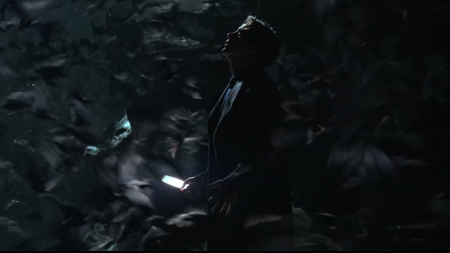
Batman Begins signaled the start of something in the mid-2000's. It broke director Christopher Nolan into his blockbuster, master-of-Hollywood phase, eventually allowing him to make two expensive and films out of original properties, a rarity when everything is based on something. It provided a gray contrast to the lighter Spiderman films that were dominating the comic-book box office, and also lit the joyless path that DC comic films would spend the next decade skulking down. With its themes of resilience in the face of fear and societal collapse, Batman Begins also overtly tries to merge the heightened comic-book world with the post-9/11 real world, something that would continue throughout the Dark Knight trilogy. With all the cultural weight on its shoulders, it mostly holds up as a solid origin story, if one that takes itself a bit too seriously.
Batman Begins tells the story of Gotham City's Bruce Wayne (Christian Bale), the heir to the billion-dollar Wayne fortune. After his parents are murdered in front of him at a young age, Wayne grows up to be an aimless and seething young man, desperate for meaning and focus. Nolan tracks Wayne's rise as he casts off the trappings of his life and immerses himself in the criminal underworld. He eventually lands on the radar of Henri Ducard (Liam Neeson), who is essentially a ninja, and Wayne learns how to use fear, theatricality, and deception to disarm and bewilder his foes. He and Ducard are separated after Wayne balks at his mentor's harsh methods, and Wayne returns to Gotham ready to use his newly-acquired skills to try and push his city back towards law and order. Enlisting the support of butler and confidant Alfred (Michael Caine) and the high-tech contraptions of ignored Wayne Enterprises employee Lucius Fox (Morgan Freeman), Wayne takes on the identity of the Batman, so named after his childhood fear of bats. He gathers information and breaks up drug rings, presenting the collars in a nice bow to Gotham's only honest cop, Jim Gordon (Gary Oldman) and childhood friend and current assistant district attorney Rachel Dawes (Katie Holmes). The trio eventually catches the big fish in mafia boss Carmine Falcone (Tom Wilkinson), but he's just a pawn in a larger game, as sinister prison warden Jonathan Crane (Cillian Murphy) has bigger plans for Gotham than simple extortion and drug-running.
Nolan and co-writer David Goyer have a strong grasp of origin stories, and Batman Begins has the added benefit of not being the seventeenth one in a long line of tales about people becoming superheroes. Instead, this is only the fifth or sixth, and it benefits from unique pacing and Wally Pfister's excellent cinematography. The first half of the film is jumbled between Wayne's training, his childhood, and his phase as a petulant young man, forgoing a blow-by-blow account for something more interesting. Nolan and Goyer also stuff their script with characters that speak in life lessons. While Papa Wayne annoyingly spouts of a constant stream of aphorisms, Falcone's gives a biting and necessary commentary about how difficult it must have been for young Bruce to mourn in a mansion with servants to take care of his every need, inspiring Wayne's descent into criminality and his eventual tutelage under Ducard. Once Wayne gets back to Gotham, Nolan and Goyer remember that the first attempts shouldn't necessarily go perfectly, and novice Batman is given the opportunity to clumsily jump through windows or fall down fire escapes. These are the only jokes in the film, and though humor's never been a card in Nolan's deck, it's appreciated that there are at least some shreds.
Nolan falls down when it's time for Batman to kick some butt. For all Nolan's gifts for world-building and setting a mood, he is not good at filming action. While Batman is stalking thugs, the film works, but when it's time for him to engage, the combat is lost in a mess of quick cuts and blocked angles. Nolan would improve on this in later films, but on the list of reasons to see Batman Begins, fight choreography or general bad-assery doesn't make the list.
Of the reasons to see it, the cast is hit and miss. Bale is solid in the lead, especially when he's channeling American Psycho and acting the part of a spoiled rich douche eager to throw people off his alter ego's trail. Of the older stalwarts, Oldman is having the most fun, Caine is the most affecting, while Neeson, Freeman, and Wilkinson are providing more of a general presence than memorable scenes. As the only female presence in the film, Holmes is wooden and hectoring. The clear winner is the smarmy Murphy, so committed to the role that it's impossible to take one's eyes off him. Excepting Heath Ledger's future performance as the unforgettable Joker, Murphy's Crane reigns as the best of the Dark Knight trilogy.
Nolan's attempt to merge the foundational silliness of the Batman story with something approaching contemporary reality is a solid, if joyless, effort. I've preferred most everything Marvel Studios has done in the preceding years, as there's a fundamental gap between the Dark Knight trilogy's grasping for cinematic weight and the actual product onscreen. For all its trenchant post-9/11 allegory, it's still about a billionaire playboy who spends his nights wearing pointy bat ears on his cowl. This film, and the ones that followed it, should have plenty of characters that grasp the absurdity of it all, and stop being so serious. C+
 RSS Feed
RSS Feed